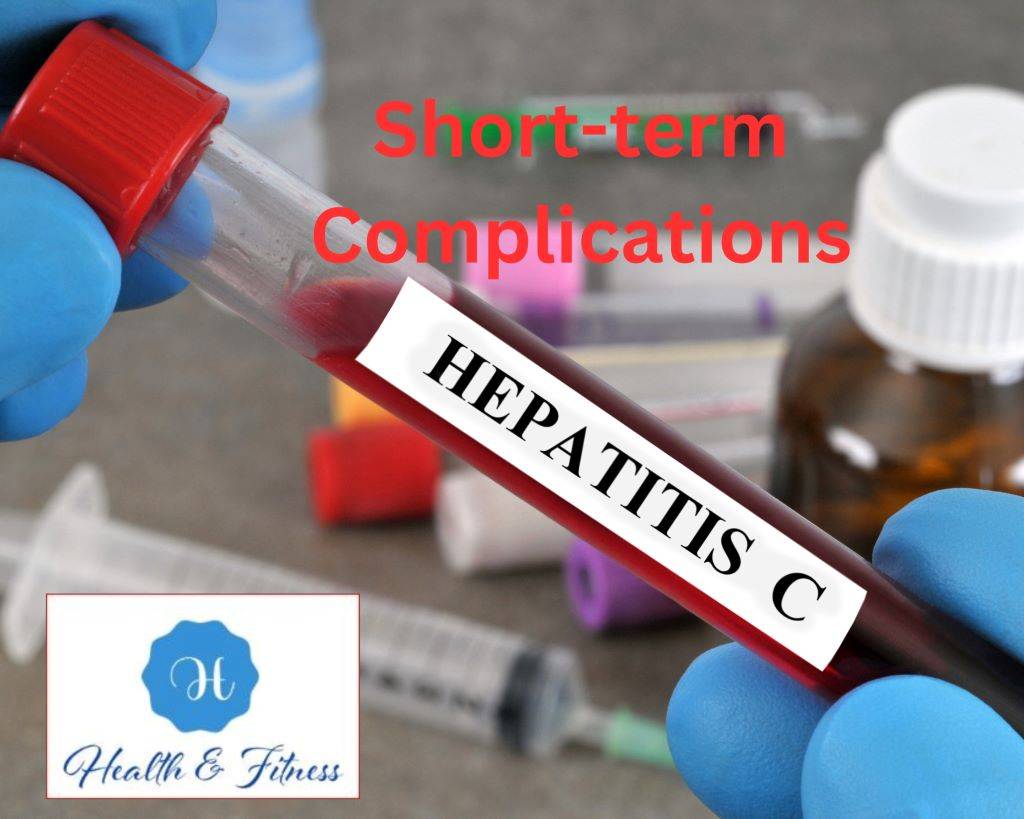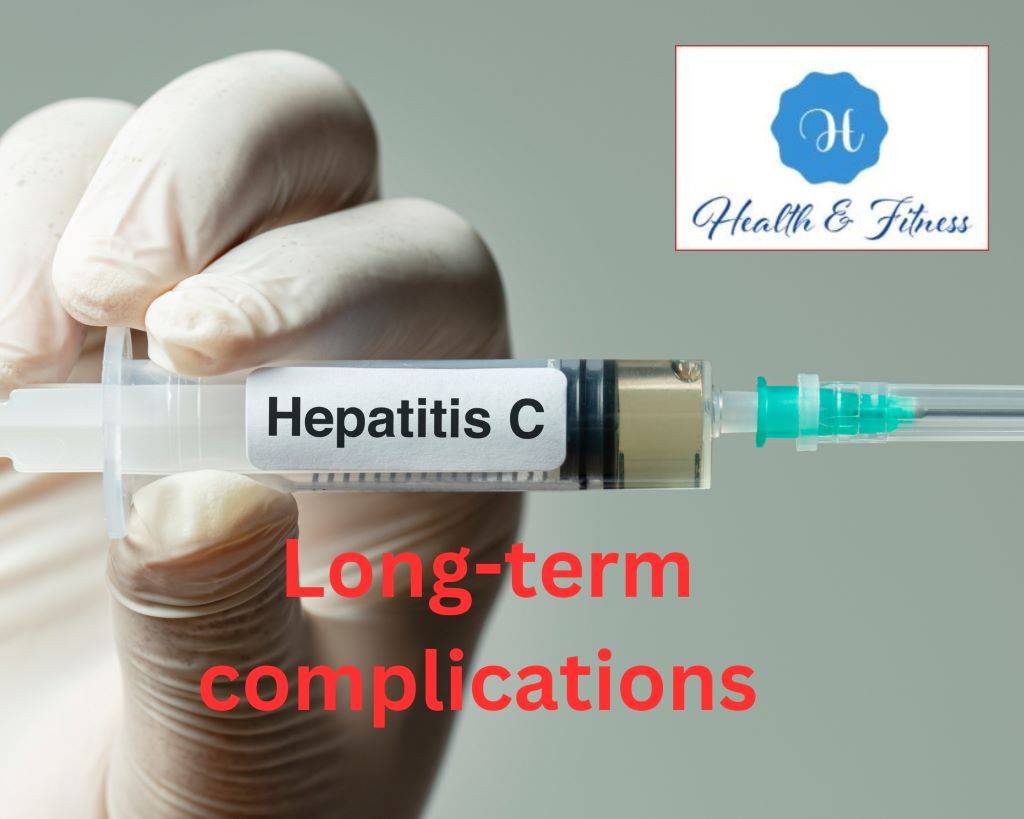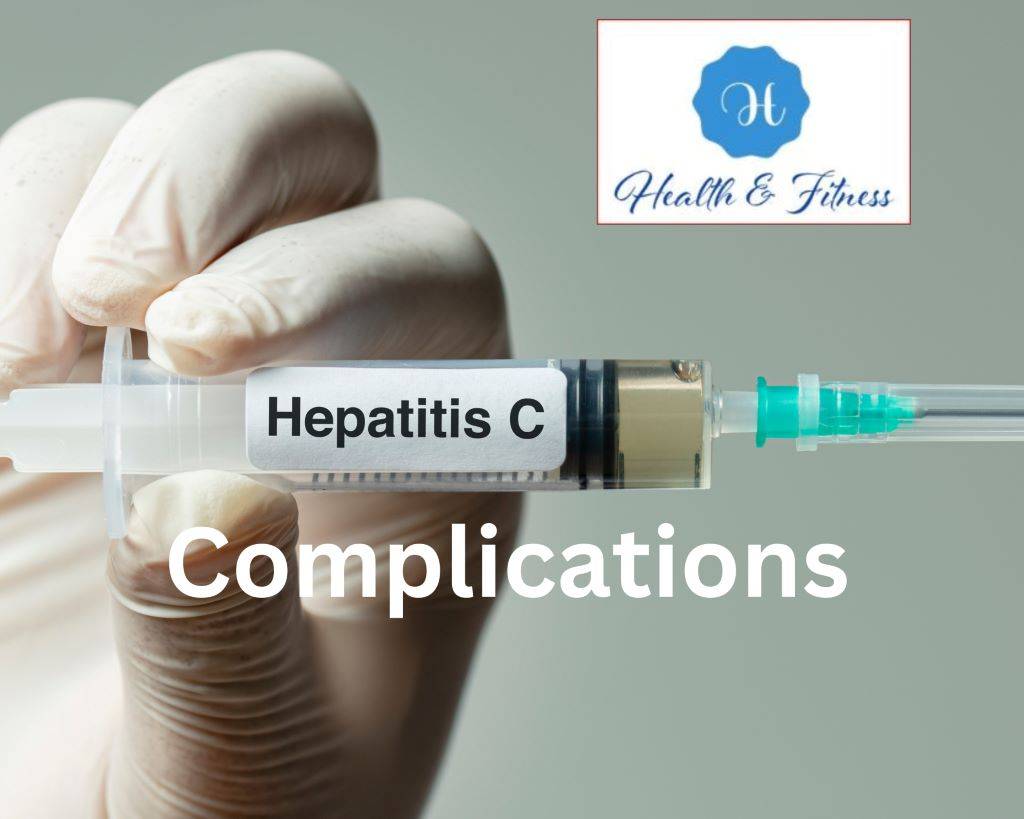Understanding the Dangers: A Comprehensive Guide to Hepatitis C Complications
Hepatitis C is a viral infection that damages the liver and spreads through infected blood. Both acute and chronic. Explore the comprehensive guide to Hepatitis C complications, understanding the potential dangers it poses. Learn about the risks, symptoms, and preventive measures in this informative blog post.
Stay informed and safeguard your health. #HepatitisCComplications #HealthGuide” Even if a person has no symptoms, hepatitis C can cause serious, sometimes fatal conditions such as liver failure, cirrhosis, hypertension, and cancer. The virus can also damage the skin, kidneys, and thyroid. Age, gender, co-infection, alcohol intake,
obesity, and smoking are all risk factors for hepatitis C. However, good management and therapy can help many patients avoid these problems. This blog will discuss hepatitis C’s consequences, extrahepatic symptoms, prevention, and treatment methods.
Short-term Complications of Hepatitis C

While many people with hepatitis C do not experience any symptoms or complications,
some individuals may develop short-term complications due to the infection.
These complications can range from mild to severe and can include the following:
1-Acute liver failure
This occurs when the liver suddenly stops working properly,
Symptoms associated with acute liver failure may manifest a few weeks after the onset of the disease. Such symptoms may comprise jaundice, fatigue, confusion, and abdominal swelling. Acute liver failure can be severe and life-threatening; liver transplantation may be necessary in severe cases.
2- Ascites
This is the fluid buildup in the abdomen, which can result from liver damage or inflammation.
Ascites can cause abdominal discomfort, bloating, and difficulty breathing.
Treatment may involve medications to remove excess fluid or procedures to drain the fluid from the abdomen.
3- Bleeding disorders
Blood clotting issues are a possible consequence of hepatitis C, leading to bleeding disorders like easy bruising, bleeding gums, and frequent nosebleeds. Additionally, the virus can increase the risk of gastrointestinal bleeding in some cases.
4- Encephalopathy
This brain disorder can result from liver failure or liver damage. Symptoms can include confusion, memory loss, and personality changes. Treatment may involve medications to manage symptoms or procedures to reduce pressure in the brain.
5- Jaundice
This happens when the liver cannot break down the yellow material created when red blood cells degrade, bilirubin. Jaundice can result in pale faces, black urine, and yellowing of the skin and eyes.
6- Pruritus
This is a condition characterized by the intense itching of the skin. It can occur due to liver damage or inflammation and can be difficult to manage. These immediate problems can be alarming, but they are frequently treatable with the right medical care. If you have any of these symptoms or consequences, getting medical help is crucial. as prompt diagnosis and treatment can help prevent further complications and improve outcomes.
Long-term Complications of Hepatitis C

Viral hepatitis type C is a viral infection that mostly affects the liver. While some people with acute Viral hepatitis type C recover completely, 75% to 85% of those infected acquire chronic Viral hepatitis type C. If not treated, chronic Viral hepatitis type C can cause various long-term complications. Below are some of the most frequent long-term complications of Hepatitis C:
1- Liver Cirrhosis
Chronic Hep C can damage and inflame the liver, eventually resulting in the development of scar tissue (fibrosis) in the liver. This progression is known as liver fibrosis and can advance to liver cirrhosis, characterized by significant scarring of liver tissue. When liver cirrhosis progresses, it can make the liver hard, rough, and reduced, leading to potentially fatal liver failure. Chronic liver disease caused by HCV patients has a higher risk of developing liver cirrhosis, which can take years or even decades to show.
2- Liver Cancer
Liver cancer risk is also increased by chronic hepatitis C. (hepatocellular carcinoma or HCC). According to projections from the World Health Organization (WHO), 1% to 5% of individuals with chronic hepatitis C will develop liver cancer each year. Age-related increases in liver cancer risk are more likely in cirrhotic patients.
A liver transplant may be necessary to treat liver cancer, which can be fatal.
3- Kidney Disease
Chronic hepatitis C can also cause kidney damage over time. Cryoglobulinemia, a disorder that develops when aberrant proteins are present, can result from this (cryoglobulins) in the blood accumulates in the kidneys, causing inflammation and damage. Cryoglobulinemia can lead to kidney failure in severe cases.
4- Diabetes
Those with chronic hepatitis C are more likely to acquire type 2 diabetes, according to studies. This might be caused by virally generated inflammation, making it harder for the body to control blood sugar levels.
Diabetes can lead to several health issues, including cardiovascular disease, nerve damage, and kidney damage.
5- Sjogren’s Syndrome
An autoimmune condition called Sjogren’s syndrome affects the glands that make saliva and tears. Those with chronic hepatitis C are more likely to experience it than average people. Sjogren’s syndrome patients may experience various symptoms, such as dry mouth and eyes.
6- Cryoglobulinemia
An abnormal blood protein disease called cryoglobulinemia can harm organs and blood arteries. Those with chronic hepatitis C are more likely to experience it than average people. The symptoms of cryoglobulinemia might range from skin rashes to joint pain to kidney impairment.
7- Neurological Disorders
Moreover, chronic hepatitis C can harm the central nervous system, resulting in cognitive impairment,
peripheral neuropathy, and encephalopathy, among other diseases (problems with memory and thinking).
These illnesses seriously influence a person’s quality of life and can be incapacitating.
8- Cardiovascular Disease
Those with chronic hepatitis C are more prone to heart attacks, strokes, and coronary artery disease.
Although the exact causes are unknown, it may be related to the virus’s inflammation, which might change blood vessels and increase the likelihood of plaque accumulation.
9- Arthritis
Some people with chronic hepatitis C may develop joint pain and inflammation, leading to arthritis.
This is thought to be due to the immune system attacking the joints in response to the virus.
10- Skin Disorders
Chronic hepatitis C can also cause various skin problems, such as dry skin, itching, and rashes. Sometimes, it can result in a condition referred to as porphyria cutanea tarda (PCT), which develops blisters, weakened skin, and heightened susceptibility to sunlight. PCT occurs when the liver cannot process a substance called porphyrin, which can build up in the blood and cause skin problems.
11- Lymphoma
Lymphoma is a malignancy that attacks the lymphatic system. This is in charge of battling infection in the body.
Individuals with hepatitis C are more likely to develop lymphoma than those without the infection. The reason for this correlation is unclear, but the virus could induce persistent inflammation and immune system malfunction, increasing the likelihood of cancer. However, it’s not definite that chronic hepatitis C will cause all long-term complications. The risk differs based on age, gender, genetics, and lifestyle. Those with the condition should work with their healthcare provider to manage it and minimize risks. This can include checkups, monitoring liver function, lifestyle changes, and receiving antiviral medications to clear the virus and prevent complications.
Extrahepatic Manifestations of Hepatitis C
Hepatitis C not only affects the liver but can also lead to various extrahepatic manifestations, which are conditions that occur outside of the liver. Here are some examples of extrahepatic manifestations of hepatitis C:
1- Cryoglobulinemia
Cryoglobulinemia is a condition in which abnormal proteins in the blood called cryoglobulins clump together and form deposits in small blood vessels throughout the body. This can cause damage to organs and tissues, leading to various symptoms such as skin rashes, joint pain, and nerve damage. Cryoglobulinemia is strongly associated with hepatitis C, with up to 50% of individuals with chronic Viral hepatitis type C developing this condition.
2- Sjögren’s syndrome
Sjögren’s syndrome is an autoimmune disorder that affects the body’s moisture-producing glands, leading to symptoms such as dry eyes and mouth. It can also cause fatigue, joint pain, and difficulty swallowing. Studies have shown that individuals with hepatitis C risk developing Sjögren’s syndrome more than those without the virus.
3- Lichen planus
Lichen planus is a skin condition that causes itchy, red or purple bumps on the skin or mouth. It can also cause hair loss and nail damage. Research has found that hepatitis C infection is a common trigger for lichen planus, with up to 20% of individuals with lichen planus testing positive for hepatitis C.
4- Rheumatologic disorders
Viral hepatitis type can also induce rheumatologic diseases such as arthritis and vasculitis (blood vessel inflammation), as well as myalgia (muscle pain). These illnesses may cause joint pain, stiffness, edema, and other symptoms such as fever and tiredness.
5- Hematologic disorders
Hepatitis C may also impact the blood, resulting in hematologic issues such as anaemia (low red blood cells), thrombocytopenia (low platelets), and leukopenia (low white blood cells), causing fatigue, weakness, and increased risk of bleeding or infection. It’s worth noting that not everyone with hepatitis C will encounter these extrahepatic manifestations. People with chronic Viral hepatitis type C should be aware of these possible complications and speak to their healthcare provider if they experience symptoms. Proper antiviral therapy management of Viral hepatitis type C can also help mitigate the risk of these complications.
Factors that Increase the Risk of Hepatitis C Complications
While anyone with hepatitis C is at risk for complications, certain factors can increase the likelihood of developing more severe or long-term complications. Here are some of the risk factors:
1- Age
Older age is associated with a higher risk of developing complications from hepatitis C. As the immune system ages, it becomes less effective at fighting off infections and may be less able to keep hepatitis C under control.
2- Duration of infection
The longer a person has been infected with hepatitis C, the greater their risk of developing complications. Chronic hepatitis C infection can cause ongoing inflammation in the liver, leading to liver damage and scarring over time.
3- Viral load
The amount of hepatitis C (HCV) in the blood, also known as the viral load, can impact the likelihood of developing complications. Individuals with a high viral load may be at a greater risk for liver damage and other complications.
4- Alcohol consumption
Alcohol consumption can exacerbate the effects of hepatitis C on the liver and increase the risk of developing liver damage and cirrhosis. For individuals with hepatitis C, it is important to limit or avoid alcohol consumption altogether.
5- Co-infection with other viruses
Co-infection with other viruses, such as hepatitis B or HIV, can increase the risk of complications from hepatitis C. These infections can cause additional damage to the liver and weaken the immune system, making it harder to fight off the hepatitis C virus.
6- Genetics
Certain genetic factors may also play a role in developing Viral hepatitis type C complications. For example, genetic variations may increase the likelihood of developing liver damage or liver cancer in response to chronic Viral hepatitis type C infection. It is important for individuals with hepatitis C to be aware of these risk factors and to work closely with their healthcare provider to manage their condition and reduce the risk of complications.
Treatment for hepatitis C, including antiviral medications, can help slow or even reverse liver damage in some cases. Early intervention is key to preventing more severe complications from developing.
Prevention and Management of Hepatitis C Complications
Preventing and managing complications of hepatitis C involves a combination of lifestyle changes, medical interventions, and close monitoring of the condition. Here are some ways to prevent and manage hepatitis C complications:
1- Antiviral medications
Antiviral medications are the primary treatment for hepatitis C and can help to reduce the risk of complications by suppressing the virus and reducing inflammation in the liver. These medications are often highly effective and can cure the infection in many cases.
2- Lifestyle changes
Making certain lifestyle changes can also help to reduce the risk of complications from hepatitis C. This includes avoiding alcohol and recreational drugs, eating a healthy diet, exercising regularly, and maintaining a healthy weight. It is also important to avoid exposure to other viruses that can impact the liver, such as hepatitis B and HIV.
3- Monitoring and follow-up care
Regular monitoring and follow-up care are important for individuals with hepatitis C, especially those at a higher risk for complications. This includes regular blood tests to monitor liver function and viral load and imaging tests such as ultrasound or MRI to assess for liver damage.
4- Treatment of complications
If complications occur, prompt treatment is important to prevent further damage and improve outcomes.
Treatment may involve medications to manage symptoms, lifestyle changes to reduce stress on the liver,
or in some cases, surgery or other invasive procedures to address more severe complications such as liver cancer.
Overall, the best way to prevent and manage hepatitis C complications is to work closely with a healthcare provider to monitor the condition and develop a comprehensive treatment plan that addresses all aspects.
With proper management, many individuals with Viral hepatitis type C can live healthy, active lives and avoid the most severe complications.
Conclusion
In conclusion, Chronic liver disease caused by HCV may cause several health and quality-of-life issues.
Some consequences are minor and easily treated, while others are serious and need immediate and continuous treatment. Antiviral drugs, lifestyle adjustments, and regular monitoring may prevent and treat hepatitis C problems. A complete treatment plan that prevents problems requires close collaboration with a healthcare practitioner. Hepatitis C patients should be aware of possible problems and seek medical assistance if symptoms or health concerns arise. Many people with Viral hepatitis type C may live healthy, active lives and escape the worst problems with careful treatment.
Reference
https://www.cdc.gov/hepatitis/hcv/index.htm
https://www.cancer.org/cancer/liver-cancer/causes-risks-prevention/risk-factors.html



